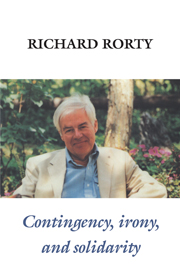3 - The contingency of a liberal community
Published online by Cambridge University Press: 05 June 2012
Summary
Anyone who says, as I did in Chapter 1, that truth is not “out there” will be suspected of relativism and irrationalism. Anyone who casts doubt on the distinction between morality and prudence, as I did in Chapter 2, will be suspected of immorality. To fend off such suspicions, I need to argue that the distinctions between absolutism and relativism, between rationality and irrationality, and between morality and expediency are obsolete and clumsy tools – remnants of a vocabulary we should try to replace. But “argument” is not the right word. For on my account of intellectual progress as the literalization of selected metaphors, rebutting objections to one's redescriptions of some things will be largely a matter of redescribing other things, trying to outflank the objections by enlarging the scope of one's favorite metaphors. So my strategy will be to try to make the vocabulary in which these objections are phrased look bad, thereby changing the subject, rather than granting the objector his choice of weapons and terrain by meeting his criticisms head-on.
In this chapter I shall claim that the institutions and culture of liberal society would be better served by a vocabulary of moral and political reflection which avoids the distinctions I have listed than by a vocabulary which preserves them. I shall try to show that the vocabulary of Enlightenment rationalism, although it was essential to the beginnings of liberal democracy, has become an impediment to the preservation and progress of democratic societies.
- Type
- Chapter
- Information
- Contingency, Irony, and Solidarity , pp. 44 - 70Publisher: Cambridge University PressPrint publication year: 1989
- 9
- Cited by



